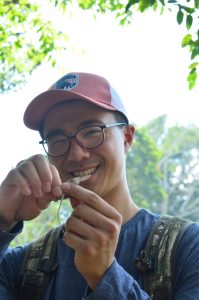It’s felt like we’ve been here for months, and when new faces showed up at the Research Station, we naturally told them: welcome to Peelize and continued to talk about our urines for the next half-hour.
48 hours since the start of our pee experiment, this morning was the deadline for the end of our experiment. We started on trail at 9 am to pick up the pitfall traps we have placed on the forest floors and in the canopy two days prior. Of the 40 pitfall traps, most had all sorts of organisms in it, mostly arthropods like spiders, beetles, bees, ants, and grasshoppers.
We then sorted individuals into morpho-species, or species distinguished by their morphological characters. For example, I was the ‘expert’ in charge of assigning morpho-species to bees, and found a total of 2 morpho-species of bees that we referred to as Bee A and Bee B. Bee A had a ‘green v-neck’ on the back of its thorax while Bee B did not and was about 3-4 times smaller. At the end of our sorting, we analyzed our data and found that proportionally speaking, there were more arthropods in the nitrogen pitfall traps in the canopy than there were in the forest floor. Our main conclusion was that nitrogen is likely to be more of a limiting nutrient in the canopy than it is in the forest floor.
Afterwards, we presented our data to fellow students that arrived at the station from Mississippi, starting with a warm welcome to Peelize.

